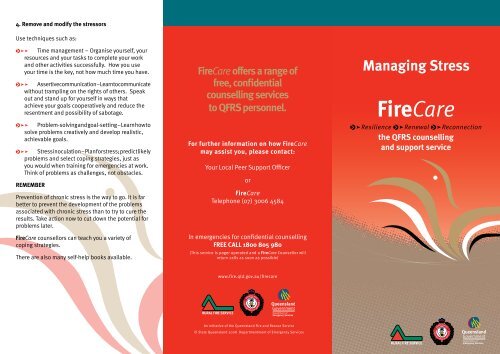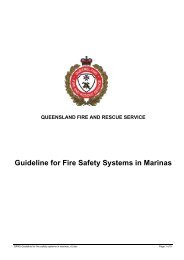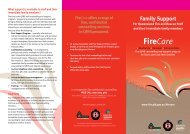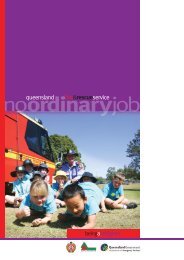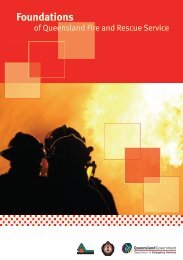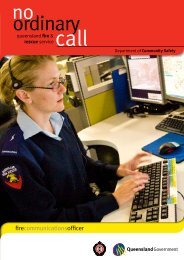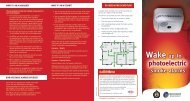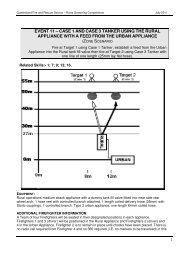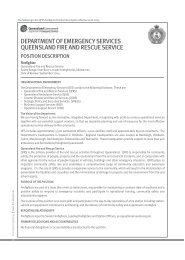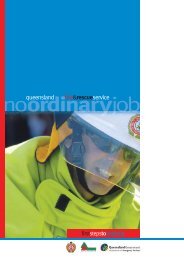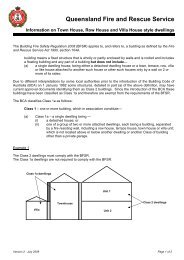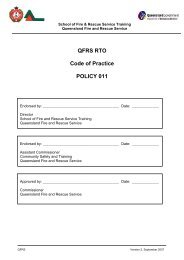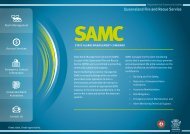Firecare: Managing Stress - Queensland Fire and Rescue Service
Firecare: Managing Stress - Queensland Fire and Rescue Service
Firecare: Managing Stress - Queensland Fire and Rescue Service
- No tags were found...
You also want an ePaper? Increase the reach of your titles
YUMPU automatically turns print PDFs into web optimized ePapers that Google loves.
4. Remove <strong>and</strong> modify the stressorsUse techniques such as:ooooTime management – Organise yourself, yourresources <strong>and</strong> your tasks to complete your work<strong>and</strong> other activities successfully. How you useyour time is the key, not how much time you have.Assertive communication – Learn to communicatewithout trampling on the rights of others. Speakout <strong>and</strong> st<strong>and</strong> up for yourself in ways thatachieve your goals cooperatively <strong>and</strong> reduce theresentment <strong>and</strong> possibility of sabotage.Problem-solving <strong>and</strong> goal-setting – Learn how tosolve problems creatively <strong>and</strong> develop realistic,achievable goals.<strong>Stress</strong> inoculation – Plan for stress; predict likelyproblems <strong>and</strong> select coping strategies, just asyou would when training for emergencies at work.Think of problems as challenges, not obstacles.REMEMBERPrevention of chronic stress is the way to go. It is farbetter to prevent the development of the problemsassociated with chronic stress than to try to cure theresults. Take action now to cut down the potential forproblems later.<strong>Fire</strong>Care counsellors can teach you a variety ofcoping strategies.There are also many self-help books available.<strong>Fire</strong>Care offers a range offree, confidentialcounselling servicesto QFRS personnel.For further information on how <strong>Fire</strong>Caremay assist you, please contact:Your Local Peer Support Officeror<strong>Fire</strong>CareTelephone (07) 3006 4584In emergencies for confidential counsellingFREE CALL 1800 805 980(This service is pager operated <strong>and</strong> a <strong>Fire</strong>Care Counsellor willreturn calls as soon as possible)<strong>Managing</strong> <strong>Stress</strong><strong>Fire</strong>Careo Resilience o Renewal o Reconnectionthe QFRS counselling<strong>and</strong> support servicewww.fire.qld.gov.au/firecareAn Initiative of the <strong>Queensl<strong>and</strong></strong> <strong>Fire</strong> <strong>and</strong> <strong>Rescue</strong> <strong>Service</strong>© State <strong>Queensl<strong>and</strong></strong> 2008 Departmentment of Emergency <strong>Service</strong>s
What is stress?<strong>Stress</strong> is the body’s natural reaction to any dem<strong>and</strong>for us to change. It may result from excitement as wellas problems. You must experience stress to live, butwhat one person finds stressful, another may enjoy(e.g. parachuting).However, excessive or prolonged stress results inphysical, psychological <strong>and</strong> behavioural signs ofdistress such as pain, fatigue, anxiety, depression,substance abuse <strong>and</strong> relationship conflicts. Too littlestress (boredom) can also be harmful.The aim is to manage stress, not avoid it. The goal isto harness the beneficial results of stress (stimulation,motivation to achieve) <strong>and</strong> to anticipate <strong>and</strong> controlstressors to minimise harmful effects.Sources of stress (stressors)<strong>Stress</strong>ors arise from our own behaviour <strong>and</strong> approachto life (internal stress) <strong>and</strong> our interactions with theworld around us (external stress).Common sources of stress include:o Life cycle – what stage we are ato Environment – noisy neighbourso Society – other’s expectationso Work issues <strong>and</strong> dem<strong>and</strong>so Family <strong>and</strong> interpersonal relationshipso Our own behaviour – anger & impatienceo Illness or paino Unhealthy lifestyle (diet, little exercise, workload)Major stressors can be caused by:o personal loss, such as the death of a loved one orthe end of a relationshipo threat of physical dangerSigns of stressBodyo Tension, muscle aches, backache, headacheo High blood pressure, fatigueo Shaking, nervous ticso Stomach <strong>and</strong> bowel problemso Breathing difficultieso Frequent infectionsBraino Poor concentration, forgetfulnesso Poor decision-makingo Dwelling on problemsBehaviouro Overuse of alcohol, drugs, cigarettes, caffeinedrinks or tranquilliserso Sleep difficultieso Overwork or work avoidanceo Frequent accidentso Easily startled by noiseo Crying easily or anger outburstsEmotionso Anxiety, depression, nervous tensiono Irritabilityo Loss of confidence, low self-esteemo ExhaustionHelpful hints to manage stress1. Reduce your vulnerability to stressLearn the facts about stress. Become aware of sourcesof your stress by keeping a stress diary to recordproblem situations <strong>and</strong> how you use your time.Develop a healthy, balanced lifestyle.For example:o Eat a balanced diet, in conjunction with reducedcaffeine intake (tea, coffee, chocolate, some softdrinks) <strong>and</strong> reduce alcohol intake.o Stop smoking, exercise regularly <strong>and</strong> ensure thatyou have adequate recreation. This will help topromote a regular sleep pattern <strong>and</strong> face each dayrefreshed.o Develop a support network.When you feel stressedooTry to identify the source of your stress <strong>and</strong>then try to constructively address the problem.However, it is not always possible to controlthe source of stress. In these cases we musttry hard to manage its effects.Switch off the stress response by replacingthe stress response with physical <strong>and</strong> mentalrelaxation strategies.2. Use physical relaxation strategiesooooChannel energy into other activities likeexercise <strong>and</strong> hobbies. Listen to or play music.Surf, walk or try art.Learn muscle relaxation <strong>and</strong> meditationstrategies. Sit or lie in a relaxed position <strong>and</strong>focus only on breathing in <strong>and</strong> out. Breathenaturally. Let your muscles go limp starting atthe feet <strong>and</strong> working up the body. Imagine acalm <strong>and</strong> peaceful place where you might relax<strong>and</strong> spend time thinking about the details asyou are relaxing. Let thoughts come <strong>and</strong> go likeclouds in the sky. Don’t dwell on them.Take time out to regain control.Find ways to prevent the situation fromhappening again.3. Learn to talk sense to yourselfooLearn how to identify problem thinking –“I can’t st<strong>and</strong> this …I’ve had it with him/her…I’m falling apart <strong>and</strong> I can’t do it.”Learn how to challenge <strong>and</strong> alter such faultythinking patterns rather than dwelling onproblems. “I have h<strong>and</strong>led these situationsbefore so I can now. I am cool, calm <strong>and</strong>confident.”Learn to manage bad feelings by usingcoping statements. “I don’t have to reactto those silly comments. I’ll take time outto relax my muscles.”


